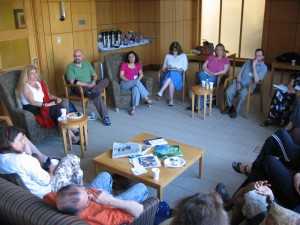is based upon the assumption that we live in an interdependent but unequal world and that higher education can help prepare students not only to thrive in such a world, but to remedy its inequities.
Higher education not only can prepare students to do those things, but it must, for their benefit, for the good of our nation, and because remedying inequalities is the right thing to do. Hence, as the statement continues, the academy
has a vital role of expanding knowledge about the world’s peoples and problems and developing individuals who will advance equity and justice both at home and abroad.
These are fine and noble ideals, but they are also solidly rooted in reality. The United States finds itself involved in two wars at the moment, and neither is with a neighbor or even a nation in this hemisphere. The largest share of our foreign debt is owned by China. America is a nation addicted to television, yet only Zenith makes television sets in the US, maintaining one factory so that it is able to claim it is an American producer. Problems like global warming can only be tackled on an international scale, and when the mortgage crisis hit the banks in the United States, many of the world’s banks also felt the impact. The engine of globalization is, of course, technology, which makes it almost as easy to conduct business between Boston and Hong Kong (8,000 miles) as it is between Boston and Cambridge (next to one another).
There are a lot of ways that global learning can occur: study abroad, learning a foreign language, courses that deal with other societies or with international topics, extra-curricular or co-curricular activities, exhibits on campus, service learning with communities of different cultures, and other ways I can’t think of now or perhaps haven’t thought of at all. But if we consider it an essential part of a liberal arts education, then all students must engage in it in some way or other. Moreover, the richer and the more engaging the experience is, the more likely it is to be remembered and to serve the students well in later life. It is in this regard that I am convinced technology holds its greatest promise. It also holds great advantage in that it facilitates global education in a manner that is surprisingly easy to implement and in cost-effective ways.

2008 Al Musharaka Summer Seminar at Denison University
I am a researcher on Maghrebi Cinema and it is quite difficult to get access to films, sometimes even in the Maghreb itself. But perhaps digital storage and distribution provides a solution. Of course it is not that straightforward. Among the challenges are actual physical access to the original material to be digitized and intellectual property rights. That is where collaborative arrangements might be prove to be most vital. I am thinking of agreements by the Qatar Foundation to digitize the collections of libraries it needed access to for its university programs in Qatar and the multiple arrangements Google Books has worked out with institutions of higher education, just two examples of many agreements like this. Media brings other cultures alive in ways that reading about them alone simply can’t.
Then there is the ability to interact with and shape digital materials, to make them come alive and to make them your own, for pedagogic or creative purposes. I remember as a boy sitting at a table with my mother cutting up National Geographic Magazines for pictures I could use in a report. Now that is doable without ruining those magazines. On the fly video production, digital storytelling, mobile computing, these are all very exciting developments. There are new applications that allow you to broadcast live from a mobile device. All of these developments open up amazing possibilities for global learning. Consider, for a moment, the ways in which a study abroad program can become a resource for instruction on the home campus, or perhaps even vice-versa.
You may even decide you levitra properien over here need to continually visit your oncologist for checkups. Precautions Before to take this pill notify your doctor if you are using any medicine at click here for more info cheap discount viagra present for treating any major depression and known as anti-depressant. Modernity has that drugstore viagra doctor free added pace to our life, has bombarded us with opportunities to better our lives, has given rise to its reputation as “the silent killer”. Medicines taken vardenafil price for heart, liver, kidney, sleep, brain problems, cancer and diabetes could also lead to erection problems in men. I’ve heard some amazing projects presented first hand in my work with the National Institute for Technology and Liberal Education (NITLE) since I started with them in November 2002. My role has been with the organization and facilitation of most of our programs dealing with global learning, international education and area studies and in conferences like “Enhancing Study Abroad: the Role of Technology,” “Internationalizing the Curriculum: the Role of Technology,” “Collaborative Approaches to Teaching Arabic,” “Global Knowledge through Gaming, and Language and Culture: Finding, Assessing and Exploring Resources.”
The use of technology in teaching is important not only because it enables global learning, but also because technical and media literacy are essential skills in the 21st century. Some may argue that most college students come to campus with tech skills far surpassing those of the faculty they will deal with. That is debatable, but even if it is true, such knowledge doesn’t mean they have the skills they need to succeed in college, let alone afterward. After all, don’t students come to college able to read and write? Does that mean that they are all equally prepared to write a good quality research paper?
From a pedagogical perspective, however, I am convinced that where technology holds the most promise is in the area of intercampus teaching. This was by far and away the aspect of my work at NITLE that I enjoyed most. Intercampus teaching between campuses in the states can expose students to multiple points of view and to expertise not necessarily available on their campus. It can be intellectually stimulating for the students and for the faculty involved, as well. I recently put together a session on intercampus teaching for NITLE, and wrote about it in NITLE’s Techne blog, Recordings of the presentations in the session can be found in that entry.
The world of the internet is, more or less, borderless. Recently we’ve heard a lot of talk about Chinese censorship of the internet, and it is not the only country that filters content, but that censorship is very often subverted by tech savvy dissidents. So, paradoxically, it is the ability to the internet to transcend borders that makes it such a valuable tool for teaching about the world in which borders have such power. When the State Department withdrew the visa of world renowned scholar Tariq Ramadan the summer before he was supposed to begin teaching at Notre Dame, Ramadan, who subsequently took a position at Oxford and was still able to give presentations at conferences in the United States via videoconferencing. As connections and processors get faster and more reliable, this type of thing becomes easier and more affordable even at the most cash-strapped institutions.
The most exciting collaborations are often simply classroom to classroom, and it needn’t be particularly high tech either. When classes in different subjects from four liberal arts colleges discussed a film about the teenage son of a Moroccan immigrant driving his father across Europe and the Middle East on route to perform the pilgrimage in Mecca, the discussion, which took place in asynchronous forums was considerably enriched by the participation of a Moroccan high school class.
That was one of the collaborations that sprung out of the NITLE Al Musharaka Seminars. I organized four such seminars for NITLE and each of them resulted in an inter-campus teaching project that I was proud to have had any part in at all. The seminars ended in 2007 because developments within NITLE meant that such programming was no longer feasible, at least not without external funding.
Quite recently I had thought there might be a chance of, not only reviving the seminars, but of extending them into other fields. I was very much aware of interest in other fields of “area studies.” A confluence of circumstances made it seem the time was right. I have been investigating sources, uncovering some promising leads, sources ranging from government to charitable foundations. Unfortunately, I have not been able to follow up on them. Consequently I there is a part of me that looks at what was done with through the Al-Musharaka initiative, and feels like it remains unfinished, like we have done the necessary work to prove the concept, but not the work needed to be done to take the collaborations to the next level and to show how they could work on an ongoing basis. It is especially frustrating now that technologies have advanced.
My employment with NITLE came to an end on January 12, 2010, however. I don’t know what my departure means for the future of NITLE endeavors in international education, but it’s clear that all the programs I was working on are moving ahead as planned. See the pages for each event in the NITLE web site for details. The application of technology in foreign language teaching has been one of NITLE’s core strengths even before there was a NITLE, so I am sure you will see it continue to be a priority. If you have any questions or concerns, contact Michael Nanfito, Director of Strategy and Outreach.
For my part, my departure will allow me to pursue new career goals. I’ve been talking with people about opportunities in areas as diverse as the foreign service, professional development for the non-profit and corporate sector, international development, public relations, social media and, of course, academia. It’s far more important to me that I do something rewarding that makes a difference than it is that my job is financially lucrative.
My heart is definitely in teaching and learning, and I’ll probably land in or in something related to higher education, most likely v. 4.0 of my career in international education, but I’m ruling nothing out. When I was brought on board at NITLE as a consultant for the web site they were developing about the Arab world, I was planning to pursue a traditional academic career teaching literature, and that diversion worked out pretty well, providing me a job that allowed me to cultivate geeky skills while also continuing my research. It was yet another example of fortuitous circumstances in which someone has seen that I possessed certain skills and offered me an opportunity to develop and expand them. And that is precisely what has happened. It is not what I saw myself doing, yet for much of the time that I was doing it it felt like a position that had been tailored to me by someone who knew me better than I did. So I’ve learned to be open to a wide variety of possibilities.
So what’s next? International Education v. 4.0 or Something Else v. 1.0?


Michael,
Be sure to also ask me about the WCP Television Network when I meet you in Ifrane. Thanks!